|
|
|
Sort Order |
|
|
|
Items / Page
|
|
|
|
|
|
|
| Srl | Item |
| 1 |
ID:
105863
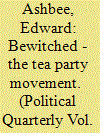

|
|
|
|
|
| Publication |
2011.
|
| Summary/Abstract |
This article considers the development of the Tea Party movement, the character of its thinking and the nature of the interests and constituencies to which it is tied. The article suggests that despite the importance of ideas and interests, and the process of interaction between them, the movement has also been shaped and energised by institutional arrangements. In particular, it argues that there are significant numbers of independent or 'detached' conservatives and that the institutional architecture draws them towards political engagement but at the same time imposes constraints. The political friction that this creates has contributed to the anger that has characterised the movement. While the Tea Party movement may, as such, have only an ephemeral existence, independent conservatives are likely to remain a significant and potent constituency and will, within the institutional structures that define the American political process, give rise to other movements and protests.
|
|
|
|
|
|
|
|
|
|
|
|
|
|
|
|
| 2 |
ID:
133660
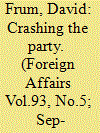

|
|
|
|
|
| Publication |
2014.
|
| Summary/Abstract |
Three big trends -- a growing reliance on older voters, an extremist ideological turn, and an increasing internal rigidity -- have changed the Republican Party over the past decade, weakening its ability to win presidential elections and inhibiting its ability to govern.
|
|
|
|
|
|
|
|
|
|
|
|
|
|
|
|
| 3 |
ID:
149223
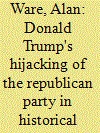

|
|
|
|
|
| Summary/Abstract |
Four aspects of Donald Trump's hijack of the Republican party are examined. First, how he used unconventional techniques, usually associated with some ‘reality’ television programmes, to become the leading candidate in the pre-primary debates. He could thereby develop ‘momentum’ before the primaries began despite his limited support among Republican activists. Second, how his insurgency differed from the party's takeover in 1964 by supporters of Barry Goldwater. Third, how the Republicans have replaced the Democrats since the early 1980s as the party with a less cohesive potential coalition among voters, with the result that internal party relations became more conflictual throughout the period. Finally, that internal conflict has been intensified by two factors in those decades: the prevalence of divided government, which has made it virtually impossible to impose a truly conservative agenda on federal government policy, and the impact of forty years of stagnating real incomes for many middle-income Americans.
|
|
|
|
|
|
|
|
|
|
|
|
|
|
|
|
| 4 |
ID:
109530
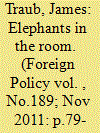

|
|
|
| 5 |
ID:
110922
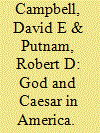

|
|
|
|
|
| Publication |
2012.
|
| Summary/Abstract |
A Feb. 29 update to the print story from the March/April issue: In the wake of the Great Recession it would seem natural that the 2012 election would be fought over economic issues. Yet so far in the Republican primaries, we have seen social issues, and religion especially, move to the forefront. Rick Santorum is only the latest in a series of Republicans who have infused their campaigns with talk about God. Even Mitt Romney, a Mormon who has generally tried to avoid discussing religion, has recently pledged to defend "religious liberty" against the Obama administration. Increasingly, the rhetoric of the leading Republican contenders echoes the Republican fringe of twenty years ago. Then, we heard Pat Buchanan -- the quintessential protest candidate -- bombastically declare that America was in the midst of a culture war. Today, the frontrunners all play to the Republican base by describing the White House's "war on religion."
|
|
|
|
|
|
|
|
|
|
|
|
|
|
|
|
| 6 |
ID:
128002
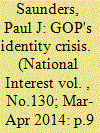

|
|
|
|
|
| Publication |
2014.
|
| Summary/Abstract |
IN 1958, after the Republican Party suffered a stinging defeat in the midterm elections that compounded the 1954 loss of its briefly held control of Congress, Whittaker Chambers sent a letter to William F. Buckley Jr. Buckley, who had founded National Review three years earlier, was trying to create a conservative insurgency. Like many other conservatives, including Ronald Reagan, he revered Chambers for his searing break with Communism and his exposure of Alger Hiss as a Soviet agent, which he chronicled in his memoir Witness. Chambers had warned the youthful Buckley against consorting with the radical Right, arguing that politicians such as Senator Joseph McCarthy discredited rather than bolstered a fledgling conservative movement.
|
|
|
|
|
|
|
|
|
|
|
|
|
|
|
|
| 7 |
ID:
133661
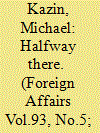

|
|
|
|
|
| Publication |
2014.
|
| Summary/Abstract |
Two big and important American social movements, both pioneered by the left, are heading in opposite directions. In recent years, lesbian, gay, bisexual, and transgender (LGBT) activists have scored one victory after another. Homosexuals now serve openly in the U.S. military and can legally marry in at least 19 states and the District of Columbia, and discrimination against them in other areas of public life is rapidly diminishing. At the same time, organized labor -- another (at least former) pillar of left-wing politics -- seems trapped in a downward spiral. Private-sector labor unions are struggling to survive, and organized public workers have become the villains of choice for numerous governors and state legislators. Understanding why the fates of these two great movements have diverged so dramatically reveals a great deal about the real influence of the left on American society today -- and the limits of that influence, as well.
|
|
|
|
|
|
|
|
|
|
|
|
|
|
|
|
| 8 |
ID:
180546
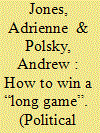

|
|
|
|
|
| Summary/Abstract |
ADRIENNE JONES and ANDREW POLSKY examine how the Republican Party engaged in counter-enforcement of the Voting Rights Act of 1965, notably during the Reagan and Bush 43 administrations, in an effort to maximize the voting strength of pro-Republican voting constituencies. They argue that sustained counter-enforcement efforts lead to sharp policy oscillations when parties alternate in power and that if a party pursues the long game of persistent counter-enforcement, it may find itself with the opportunity to achieve lasting results.
|
|
|
|
|
|
|
|
|
|
|
|
|
|
|
|
| 9 |
ID:
089549
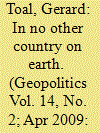

|
|
|
|
|
| Publication |
2009.
|
| Summary/Abstract |
The 2008 United States presidential election compaign presented a sharp contrast in the study of political discourse.The Democratic Party was represented by a candidate who owed his meteoric Political rise to his remarkably skillful and inspiring plitical oratory.
|
|
|
|
|
|
|
|
|
|
|
|
|
|
|
|
| 10 |
ID:
141941
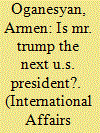

|
|
|
|
|
| Summary/Abstract |
"THE AMERICAN DREAM is dead, but I will bring it back" is the slogan with which Donald Trump literally burst into the presidential election race. The billionaire who made his fortune through real estate development and sales has seriously scared both the Democratic camp and some of his fellow party members, the Republicans. Despite all the attempts to marginalize him, Trump is confidently winning support and building up an electorate for himself.
|
|
|
|
|
|
|
|
|
|
|
|
|
|
|
|
| 11 |
ID:
149367
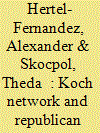

|
|
|
|
|
| Summary/Abstract |
Presidential election years attract attention to the rhetoric, personalities, and agendas of contending White House aspirants, but these headlines do not reflect the ongoing political shifts that will confront whoever moves into the White House in 2017. Earthquakes and erosions have remade the U.S. political terrain, reconfiguring the ground on which politicians and social groups must maneuver, and it is important to make sure that narrow and short-term analyses do not blind us to this shifting terrain. We draw from research on changes since 2000 in the organizational universes surrounding the Republican and Democratic parties to highlight a major emergent force in U.S. politics: the recently expanded “Koch network” that coordinates big money funders, idea producers, issue advocates, and innovative constituency-building efforts in an ongoing effort to pull the Republican Party and agendas of U.S. politics sharply to the right. We review the major components and evolution of the Koch network and explore how it has reshaped American politics and policy agendas, focusing especially on implications for right-tilted partisan polarization and rising economic inequality.
|
|
|
|
|
|
|
|
|
|
|
|
|
|
|
|
| 12 |
ID:
121591
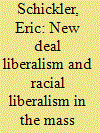

|
|
|
|
|
| Publication |
2013.
|
| Summary/Abstract |
Few transformations have been as important in American politics as the incorporation of African Americans into the Democratic Party over the course of the 1930s-60s and the Republican Party's growing association with more conservative positions on race-related policies. This paper traces the relationship between New Deal economic liberalism and racial liberalism in the mass public. A key finding is that by about 1940, economically-liberal northern white Democratic voters were substantially more pro-civil rights than were economically-conservative northern Republican voters. While partisanship and civil rights views were unrelated among southern whites, economic conservatives were more racially conservative than their economically liberal counterparts, even in the south. These findings suggest that there was a connection between attitudes towards the economic programs of the New Deal and racial liberalism early on, well before national party elites took distinct positions on civil rights. Along with grassroots pressure from African American voters who increasingly voted Democratic in the 1930s-40s, this change among white voters likely contributed to northern Democratic politicians' gradual embrace of civil rights liberalism and Republican politicians' interest in forging a coalition with conservative white southerners. In attempting to explain these linkages, I argue that the ideological meaning of New Deal liberalism sharpened in the late 1930s due to changes in the groups identified with Roosevelt's program and due to the controversies embroiling New Dealers in 1937-38.
|
|
|
|
|
|
|
|
|
|
|
|
|
|
|
|
| 13 |
ID:
125101
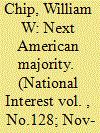

|
|
|
|
|
| Publication |
2013.
|
| Summary/Abstract |
AMERICA'S CHANGING demographics, long a delicate topic, have become an increasingly prominent part of national political debate. The subject's prominence was assured when President Barack Obama won reelection with less than 40 percent of the white vote in 2012. It quickly became conventional wisdom that Mitt Romney had antagonized Hispanic voters by proposing that illegal aliens engage in "self-deportation" and that the Republican Party was committing political suicide by catering to a shrinking white voter base. Leading Republican strategists such as Karl Rove urged the GOP to change course. Writing in the Wall Street Journal, Rove announced: "If the GOP leaves nonwhite voters to the Democrats, then its margins in safe congressional districts and red states will dwindle-not overnight, but over years and decades." Rove pointed to a Georgia county where a 339 percent increase in the Hispanic population was accompanied by a drop in the Republican share of the presidential vote-from 66.4 percent in 2000 to 51.2 percent in 2012.
|
|
|
|
|
|
|
|
|
|
|
|
|
|
|
|
| 14 |
ID:
131672
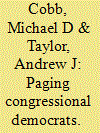

|
|
|
| 15 |
ID:
131525
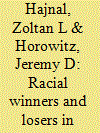

|
|
|
|
|
| Publication |
2014.
|
| Summary/Abstract |
The Democratic and Republican Parties both make strong claims that their policies benefit racial and ethnic minorities. These claims have, however, received little systematic empirical assessment. This is an important omission, because democracy rests on the ability of the electorate to evaluate the responsiveness of those who govern. We assess Democrats' and Republicans' claims by compiling census data on annual changes in income, poverty, and unemployment over the last half century for each of America's racial and ethnic groups. Judged by the empirical record, it is clear which party truly benefits America's communities of color. When the nation is governed by Democrats, racial and ethnic minority well-being improves dramatically. By contrast, under Republican administrations, blacks, Latinos, and Asian Americans generally suffer losses.
|
|
|
|
|
|
|
|
|
|
|
|
|
|
|
|
| 16 |
ID:
115190
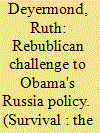

|
|
|
|
|
| Publication |
2012.
|
| Summary/Abstract |
In the two decades since the collapse of the Soviet Union, relations between the United States and Russia have oscillated between optimism and mutual suspicion. The second administration of George W. Bush (2005-09) is widely acknowledged as the lowest point in post-Cold War bilateral relations, with conflict over a range of prominent and sensitive issues such as missile defence, NATO enlargement, the practice and promotion of democracy, and the August 2008 Russia-Georgia War. In the last years of this period, the question of whether this represented the start of a 'new Cold War' was widely discussed.
|
|
|
|
|
|
|
|
|
|
|
|
|
|
|
|
| 17 |
ID:
127170
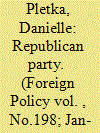

|
|
|
| 18 |
ID:
090191
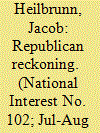

|
|
|
|
|
| Publication |
2009.
|
| Summary/Abstract |
The Republican Party is not in trouble. It is in peril. In 2006 it lost control of Congress. In 2008 it lost the presidency. And in 2010 it may lose again unless the party changes course, particularly in foreign policy, where it has, by and large, enjoyed a commanding lead over Democrats for decades.
|
|
|
|
|
|
|
|
|
|
|
|
|
|
|
|
| 19 |
ID:
103706
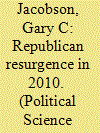

|
|
|
|
|
| Publication |
2011.
|
| Summary/Abstract |
Published continuously since 1886, Political Science Quarterly or PSQ is the most widely read and accessible scholarly journal covering government, politics and policy. A nonpartisan journal, PSQ is edited for both political scientists and general readers with a keen interest in public and foreign affairs. Each article is based on objective evidence and is fully refereed.
|
|
|
|
|
|
|
|
|
|
|
|
|
|
|
|
| 20 |
ID:
133662
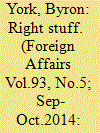

|
|
|
|
|
| Summary/Abstract |
A loose confederation of conservative thinkers and politicians is developing a new strategy for reaching out to the American middle class. These reformers could save the Republican Party -- if only they could win over their fellow conservatives.
|
|
|
|
|
|
|
|
|
|
|
|
|
|
|
|
|
|
|
|
|